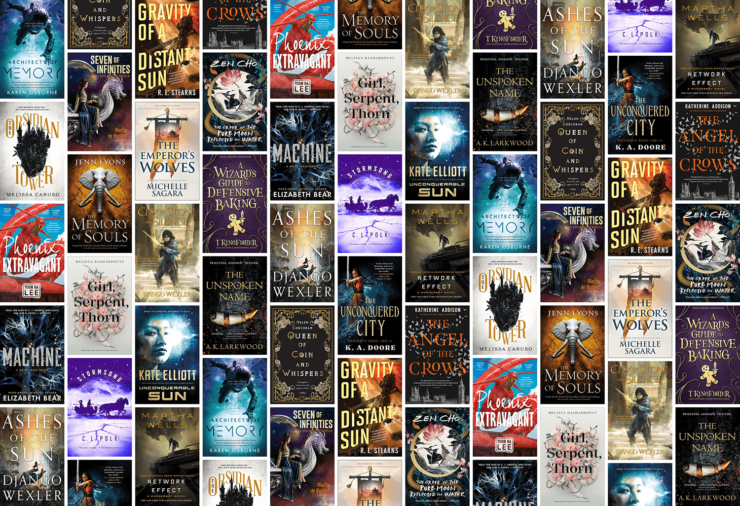What a year. I seem to keep saying that, but really, what a year. January feels like it took place in another century. And I’m sure July happened a decade ago. (Or last week. Are we absolutely certain it wasn’t last week?)
Despite the pandemic, and the rest of this year’s discontents, 2020 has been a good year for books, even if I’ve frequently had difficulty reading them. Or, at this point, remembering what year they belong to. (See above, January, another century.) But I think I’ve managed to compile my Top Twenty from 2020. Probably I have forgotten some excellent books, or failed to read them—you should see the previous column on The Best Books I Haven’t Read in 2020, if you want to see what I really meant to get to—but here’s what I think did its thing well this year.
January
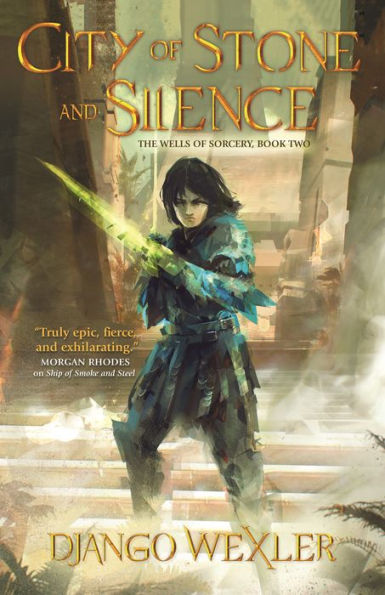
There are only two blokes on my best-of-the-year list, and one of them is Django Wexler. (Wexler’s on it twice.) City of Stone and Silence is the second novel in his Young Adult Wells of Sorcery trilogy, following from Ship of Smoke and Steel. I adore this series, with its cinematic action, fast pace, concern with revolution and power, and its compelling characters. And the queer relationships, I like those too. If you want books that are short, snappy, and epic, then this trilogy is a good one. (I have read an advance version of the concluding volume, and yes, it sticks the dismount.)
February
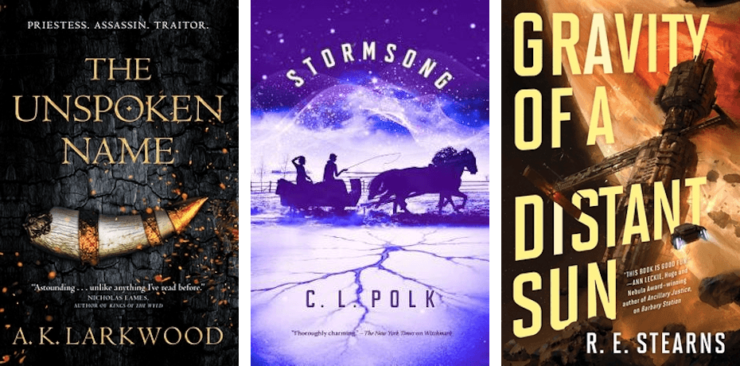
February seems like such a long time ago. Is it any wonder that I have to struggle to remember it? But I do remember three books from just before our Great Disruption hit.
A.K. Larkwood’s The Unspoken Name is a highly accomplished debut: a world-spanning coming-of-age that recalls the most entertaining parts of traditional sword and sorcery while busily reinventing the genre for a more modern age. With necromancy, compelling characters, tomb-robbing, dubious father-figures, terrible gods, queer relationships, and plenty of cool shit, The Unspoken Name makes for fantastic reading in more than one sense of the word.
C.L. Polk’s Stormsong, sequel to Witchmark, is a novel set in a city on the verge of (justified) revolution. The protagonist, Grace Hensley, has to reckon with her own complicity in atrocity and with her participation in the political system that led to atrocity, and figure out just how much she’s willing to (knowingly) compromise her principles in order to make change happen. Full of intrigue and just as queer as its predecessor, Stormsong is a remarkably satisfying novel
Do I remember all that much about R.E. Stearns’ Gravity of a Distant Sun, the third and final volume in the trilogy that began with Barbary Station? I do not, because it had a complicated plot with several moving parts. But I do remember enjoying it a great deal, and finding it to be a very satisfying payoff for the trilogy. It seems impossible that Ada and Iridian should get a happy ending, in the face of the forces arrayed against them. But they do.
May
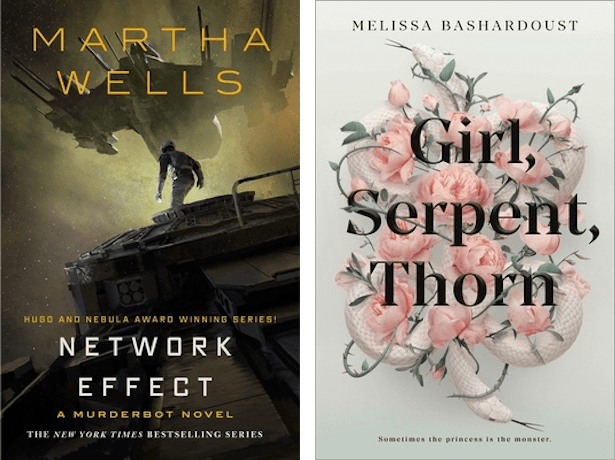
Let us just pass right over what was going on in March and April. (I don’t remember much at all from those months. Did books exist? They must have.) But in May! We got NEW MURDERBOT!
Martha Wells’ Network Effect is the first full-length Murderbot novel, following the four novellas All Systems Red, Artificial Condition, Rogue Protocol, and Exit Strategy. It’s just as exciting, humane, clever, and charming as one might expect from a Murderbot story: I’ve re-read it at least five times and found something fresh and new in it each time.
Melissa Bashardoust’s second novel, Girl, Serpent, Thorn, is a coming-of-age fantasy deeply involved in questions of trust, agency, and family. Set in a kingdom strongly influenced by medieval Persia, it has great atmosphere and some compelling characters. I enjoyed it a lot: it’s definitely worth checking out.
June

The Obsidian Tower by Melissa Caruso is the first novel in a new trilogy. Set in the same world as The Tethered Mage, The Defiant Heir, and The Unbound Empire, it takes place over a hundred years later, in a different country, and involves a whole new set of characters — and a protagonist who may end up responsible for the fate of the world. Fast-paced, magnificently characterised, tense and gritting: I’m looking forward to the sequel with the eagerness that only a well-executed cliffhanger can bring. An excellent novel.
KA Doore’s The Unconquered City is the final novel in a loosely-linked trilogy. Assassins, magic, monsters, intrigue, trauma, trust: its prickly protagonist has a lot to deal with in the course of her adventures, and makes some pretty poor—albeit very relatable—decisions on her way to saving her city, herself, and incidentally the world. Definitely an excellent contribution to assassin-centred fantasy.
The Order of the Pure Moon Reflected in Water was Zen Cho’s contribution to the publishing scene in the month of June: a short, elegant and at times elliptical novella set in a time and a place of upheaval and civil war, that follows a band of thieves (bandits) who’re just displaced persons trying to make the best of it. Queer, generous, and kind without being exactly gentle, The Order of the Pure Moon Reflected in Water is a gem of a novella.
Katherine Addison’s The Angel of the Crows is a gorgeous Holmes-and-Watson reworking set in a London populated by monsters, demons, and fallen angels, and one that brings the “Ripper” murders in on the periphery without making them the novel’s focus. Atmospheric, suffused both with an appreciation for Doyle’s work and a sense of how to modernise and make fantastical the stories and the underlying Sherlockian sensibility, it is a delightful, engaging, compelling journey through an alternate, fantastical London. And it’s queer, which is always a bonus for me.
Queen of Coins and Whispers is the debut novel from Irish author Helen Corcoran: a Young Adult fantasy novel that combines romance, intrigue, politics, and coming-of-age. Young queen Lia ascends the throne in the face of budgetary and parliamentary crises; Xenia, a young woman of the court, finds herself tapped to be Lia’s spymaster in the absence of anyone more trustworthy. The two grow closer, though their relationship is strained by the difference in their stations, their own choices, and Lia’s need to marry and secure an heir. It was exactly the kind of story I wanted to read when I read it, and it remains one of my favourite novels of the year after more than one re-read.
July
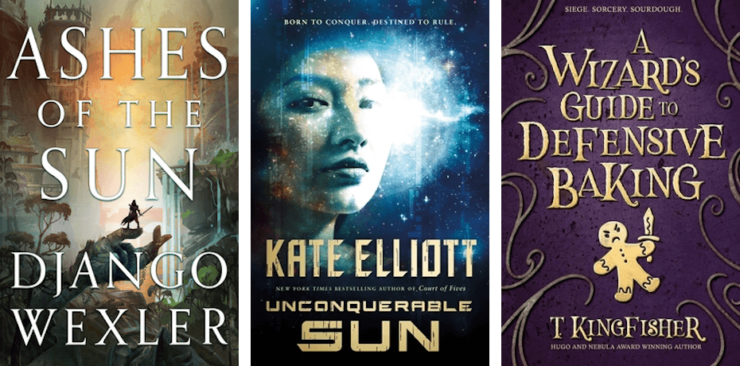
July sees Django Wexler’s second appearance on this list, with Ashes of the Sun, the opening volume of a big-world big-ideas queer-as-fuck epic fantasy. Its protagonists are siblings separated in youth, one of whom has been coopted into the service of a fairly repressive state and has found a career whose benefits she believes in; the other of whom has become a revolutionary, a radical. There are parallels to Star Wars here, as well as to other large-scale epic fantasies, but Wexler’s talent is putting character, action, and worldbuilding together with a great deal of emotional heart. And queerness, which puts it ahead of a lot of epic fantasies on my list! It’s Wexler’s best book yet, and I look forward to the next instalment.
Also the author’s best book yet: Kate Elliot’s Unconquerable Sun, a genderbent and in spaaaace version of the (formative and contentious) period in the adolescence of Alexander the Great when he was on the outs with Philip of Macedon. (It’s also absolutely at least as queer as the historic Alexander’s life.) Unconquerable Sun takes this inspiration and runs with it in a vast, complex, politically twisty space opera universe, peopled with compelling characters, military confrontations, intrigue and family secrets, and engaging worldbuilding. It’s gorgeous, and I love it.
If you don’t love T. Kingfisher’s work, then you’re not going to enjoy A Wizard’s Guide to Defensive Baking, a touching short novel about a teenage baker, her magical talent, and the failure of the adults around her to protect either the magic-users of her city or the city itself. But if you do enjoy Kingfisher’s blend of pragmatism, weirdness, kindness, and brutal practicality, A Wizard’s Guide to Defensive Baking is one of 2020’s unexpected treats.
August
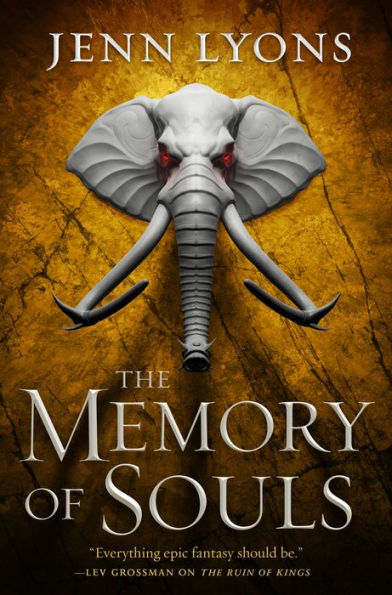
Epic fantasy doesn’t always give me what I want, and Jenn Lyons’s The Ruin of Kings was slow to pick up pace. But I’m really glad I stuck with the series, because The Memory of Souls, the third volume (after The Name of All Things), makes it clear than Lyons is subverting and deconstructing many of the traditional tropes of epic fantasy, while also writing a structurally satisfying fantasy epic within many of the conventions of the genre. It needs space, the space of several volumes, in order to do this, and in Memory of Souls the payoff finally begins be delightfully satisfying.
September
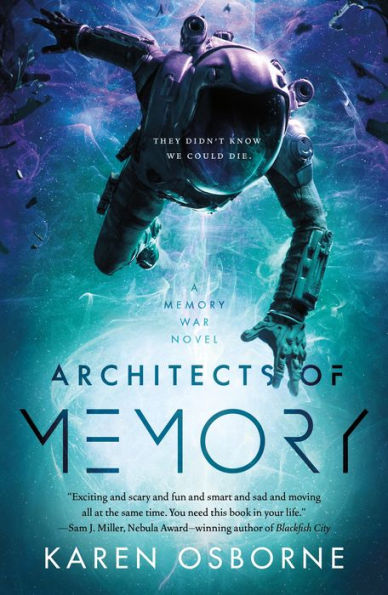
Architects of Memory is another debut novel. Author Karen Osborne brings us a vision of a corporate-run space opera future, where people can spend their whole lives under indenture to a single corporation. Salvage pilot Ash Jackson is ill with a probably-incurable disease. The captain of her salvage ship is covering for her, because they’re into each other and hope to be able to start a non-dystopian relationship some day. When their latest salvage job involves the retrieval of a potentially genocidal weapon, events begin to spiral out of control in a fast-paced combination of action, intrigue, and terrible revelations. I’m not entirely sure it sticks the dismount, but Architects of Memory is a hell of wild ride.
October
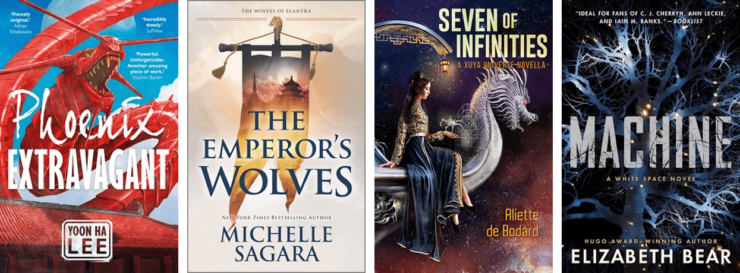
Phoenix Extravagant is the latest novel from Yoon Ha Lee. Phoenix Extravagant marks a change from Lee’s previous space opera (Ninefox Gambit and sequels): in this, he turns his hand to fantasy influenced by Korean history. Phoenix Extravagant is a novel about art, colonialism, loyalty, and the value of the past. Deftly executed, well-characterised, and full of feeling, Phoenix Extravagant is a hell of a novel.
Michelle Sagara’s The Emperor’s Wolves is the latest instalment in her long-running Elantra series. Unlike other instalments, however, this is a prequel to the main storyline, with multiple viewpoint characters, focusing the character of Severn and how he became one of the agents of the Dragon Emperor known as Wolves. It’s a “here’s another adventure of one of your favourite characters” style of novel, and it works very well.
The last two books I have to talk about are my two favourite books of the year as a whole. (No, I haven’t managed to read anything from November or December. Oops.) Aliette de Bodard’s Seven of Infinities is the latest novella in her award-winning Xuya continuity. It pairs well with The Tea Master and the Detective, but where Tea Master drew its inspiration from the Doylean Holmes-and-Watson stories, Seven of Infinities is more clearly inspired by Raffles and Arsène Lupin. When a precarious scholar with secrets and a well-respected mindship with a criminal past are faced with an unexpected dead body, their curiosity—and the consequences—leads them into the middle of a dangerous puzzle. Striking, elegant and full of feeling, Seven of Infinities is a deft jewel of a story, finely engineered.
Elizabeth Bear’s Machine, the second of her loosely-connected White Space novels, is another finely engineered space opera—a sprawling story set largely in a vast hospital station at the heart of the Synarche, the multispecies quasi-utopian society that we were first introduced to in Ancestral Night. Dr. Brookllyn Jens is a competent medical professional whose career in the medical profession has helped her deal with a life-long incurable disability, but has come at the expense of familial relationships. Her voice—equal parts cynical, abrasive, and idealistic—adds a great deal to Machine‘s complicated action-intrigue plot — involving lost generation ships, medical sabotage, dark secrets, culture clash, weird shit, and a deep-rooted betrayal of trust. It’s in part a novel about how people react when institutions in which they’ve placed their trust fail them, but it’s also big-idea space opera with so much cool shit.
***
And that, my friends, concludes my rundown of my Best Books of the year. I’m sure I’ve missed more than a few. Feel free to share your own favourites below.
Liz Bourke is a cranky queer person who reads books. She holds a Ph.D in Classics from Trinity College, Dublin. Her first book, Sleeping With Monsters, a collection of reviews and criticism, was published in 2017 by Aqueduct Press. It was a finalist for the 2018 Locus Awards and was nominated for a 2018 Hugo Award in Best Related Work. She was a finalist for the inaugural 2020 Ignyte Critic Award, and has also been a finalist for the BSFA nonfiction award. Find her on Twitter. She supports the work of the Irish Refugee Council, the Transgender Equality Network Ireland, and the Abortion Rights Campaign.










